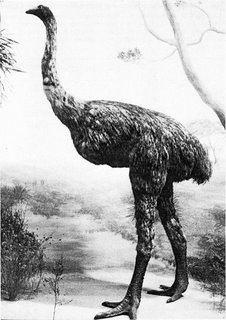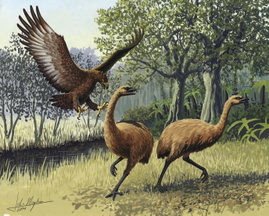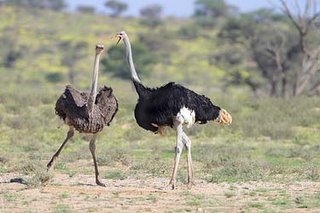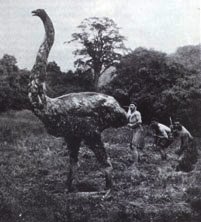
the moa (pronounced "mower") were a group of about ten related bird species from new zealand that became extinct after the arrival of homo sapiens (and dogs and rats) between 1100 and 1700ad. large and flightless, the moa varied in size but the largest weighed upwards of 500 pounds. before the arrival of humans, their main predator was a giant eagle. (how awesome is it that there was once an eagle that could take out a five hundred pound bird?) that predator, the harpagornis is, of course, also extinct.

moa belong to a genetically related group of flightless birds known as ratites. living members of this group include emus, ostriches, and kiwi, among others. interestingly, the moa are the only birds that have lost any physical trace that they once had wings and flew. (shit, even whales still have pelvic remnants. but the moa? no skeletal indications of an upper limb at all.)
ratites are an interesting group of animals in that they exhibit reverse sexual dimorphism, meaning that the females are larger (sometimes even twice as big) as their male partners and that the male birds raise the young while the females gallivant about in the forest, eating large quantities of leaves and shrubs to keep up their massive size so that they can compete with each other for the choicest of the little male birds. there is actually an article on the moa entitled:
"Female Moa Bird Liked the Little Guys, Studies Suggest"
the article settled the issue of how the large female moa got it on with the tiny males by explaining that "In ostrich, following prolonged courtship, the female sits before the male jumps on. Presumably, with some maneuvering, such a system may have also functioned in Dinornis."

(ostrich mating dance. the little one is the male. the tall, bitchy one is the female)
there you have it. the moa, in summary.
-------------------------------------------------------------------------------------------------------------
a bird-obsessed friend of mine told me about the moa and said i should look them up. so i did. and then i got to thinking. not about the moa per se, but about extinct animals in general. about what it might be like to be that last one of your kind. what would you do? would the last of the moa have been lonely? would it have known that there were no others left? that it and all of its ancestors amounted to a great big genetic zero? that it was at the end of its line and had nothing to show for it? would the last (had she been female) giant moa have kept searching until the end of her days for her tiny romeo or would she have eventually given up? would her drive to pass on her genetic information to another generation have consumed her being or would she have just been like "fuck it, what's the point?" and gotten it on with some other little male bird? an emu maybe? just for fun? ducks do that interspecies breeding thing. why not the last moa?
i guess i'm projecting too many human qualities onto the moa, but still...
what if you were it? the last representation of a lineage millions of years old. when you died your life would have meant nothing. would have been irrelevant and pointless.
i think that every person i know feels that way about themselves in some sense. maybe that explains why so many people have such a fear of death. why people need religion. need a meaning beyond simply living. we've forgotten that we are part of such a long-spanning and interconnected history and see ourselves as individual and unique species in our own right. individuals whose death will blot out for ever our lives that will have essentially meant nothing in the grand scheme of things. we'll become another big zero, just like the moa and all of the moa that came before. just another nothing in a history of 99.9% zeros. just another ending in this ongoing continuum of genetics and time.
continuum.
continuing.
a true end really makes no sense when we're talking time and genetics.
meaninglessness negates itself in such a perspective.
even for such as the moa (genetic zeros though they are).
and humans (self-absorbed fools that we are).


1 comment:
This makes me think about
* genetic diversity lost through population bottlenecks (maybe once there are too few members of a species left, it becomes pointless)
* different levels of the organization of life processes and the interdependence of species
* that need to be aware of that long-spanning and interconnected history
Post a Comment